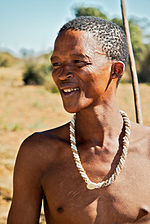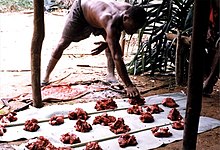Wawindaji-wakusanyaji


Wawindaji-wakusanyaji ni jina wanalopewa makundi ya watu wanaoishi bila kuzalisha chakula chao kwa njia ufugaji na kilimo kama ilivyozidi kuwa kawaida ya wengi tangu uzalishaji huo ulipoanza milenia kumi na mbili iliyopita[1].
Kwa kusongwa na wafugaji na wakulima, mara nyingi wawindaji-wakusanyaji wameishia katika maeneo yasiyofaa kwa uzalishaji, wanapoishi kwa kuhamahama, na wametazamwa na kudharauliwa kama watu wasioendelea, ingawa wanaweza kuwazidi wengine kwa maadili[2][3][4][5][6][7][8]
Kwa sababu ya kujali usawa kati yao, Karl Marx aliita mtindo wao wa kuishi Ukomunisti wa awali.[9]
Matarajio ya kuishi ni kufikia kwa wastani umri wa miaka 21-37 tu[10].
Kati ya makabila ya Afrika yaliyo maarufu kwa mtindo huo wa maisha wapo Wahadza wa mkoa wa Singida, Tanzania.
Tanbihi
[hariri | hariri chanzo]- ↑ Groeneveld, Emma (9 December 2016). "Prehistoric Hunter-Gatherer Societies". Ancient History Encyclopedia. Retrieved 9 April 2018.
- ↑ Erdal, D.; Whiten, A. (1994). "On human egalitarianism: an evolutionary product of Machiavellian status escalation?". Current Anthropology. 35 (2): 175–183. doi:10.1086/204255.
- ↑ Erdal, D. and A. Whiten 1996. Egalitarianism and Machiavellian intelligence in human evolution. In P. Mellars and K. Gibson (eds), Modelling the early human mind. Cambridge: McDonald Institute Monographs.
- ↑ Christopher Boehm (2001), Hierarchy in the Forest: The Evolution of Egalitarian Behavior, Cambridge, Massachusetts: Harvard University Press.
- ↑ Gowdy, John M. (1998). Limited Wants, Unlimited Means: A Reader on Hunter-Gatherer Economics and the Environment. St Louis: Island Press. uk. 342. ISBN 1-55963-555-X.
- ↑ Dahlberg, Frances (1975). Woman the Gatherer. London: Yale University Press. ISBN 0-300-02989-6.
- ↑ Erdal, D. & Whiten, A. (1996) "Egalitarianism and Machiavellian Intelligence in Human Evolution" in Mellars, P. & Gibadfson, K. (eds) Modelling the Early Human Mind. Cambridge MacDonald Monograph Series
- ↑ Karen Endicott 1999. "Gender relations in hunter-gatherer societies". In R.B. Lee and R. Daly (eds), The Cambridge Encyclopedia of Hunters and Gatherers. Cambridge: Cambridge University Press, pp. 411–8.
- ↑ Scott, John; Marshall, Gordon (2007). A Dictionary of Sociology. USA: Oxford University Press. ISBN 978-0-19-860987-2.
- ↑ Guenevere, Michael; Kaplan, Hillard (2007). "Longevity amongst Hunter-gatherers" (PDF). Population and Development Review. 33 (2): 326. doi:10.1111/j.1728-4457.2007.00171.x.
Marejeo
[hariri | hariri chanzo]- Vitabu
- Barnard, A. J., mhr. (2004). Hunter-gatherers in history, archaeology and anthropology. Berg. ISBN 1-85973-825-7.
- Bettinger, R. L. (1991). Hunter-gatherers: archaeological and evolutionary theory. Plenum Press. ISBN 0-306-43650-7.
- Bowles, Samuel; Gintis, Herbert (2011). A Cooperative Species: Human Reciprocity and Its Evolution. Princeton University Press. ISBN 0-691-15125-3. (Reviewed in The Montreal Review)
- Brody, Hugh (2001). The Other Side Of Eden: hunter-gatherers, farmers and the shaping of the world. North Point Press. ISBN 0-571-20502-X.
- Codding, Brian F.; Kramer, Karen L., whr. (2016). Why forage?: hunters and gatherers in the twenty-first century. Santa Fe, Albuquerque: School for Advanced Research Press, University of New Mexico Press. ISBN 9780826356963.
- Lee, Richard B.; DeVore, Irven, whr. (1968). Man the hunter. Aldine de Gruyter. ISBN 0-202-33032-X.
- Meltzer, David J. (2009). First peoples in a new world: colonizing ice age America. Berkeley: University of California. ISBN 0-520-25052-4.
- Morrison, K. D.; L. L. Junker, whr. (2002). Forager-traders in South and Southeast Asia: long term histories. Cambridge University Press. ISBN 0-521-01636-3.
- Panter-Brick, C.; R. H. Layton; P. Rowley-Conwy, whr. (2001). Hunter-gatherers: an interdisciplinary perspective. Cambridge University Press. ISBN 0-521-77672-4.
- Turnbull, Colin (1987). The Forest People. Touchstone. ISBN 978-0-671-64099-6.
- Makala
- Mudar, Karen; Anderson, Douglas D. (Fall 2007). "New evidence for Southeast Asian Pleistocene foraging economies: faunal remains from the early levels of Lang Rongrien rockshelter, Krabi, Thailand". Asian Perspectives. 46 (2): 298–334. doi:10.1353/asi.2007.0013 – kutoka Project MUSE.
{{cite journal}}: Unknown parameter|subscription=ignored (|url-access=suggested) (help)CS1 maint: date auto-translated (link) - Nakao, Hisashi; Tamura, Kohei; Arimatsu, Yui; Nakagawa, Tomomi; Matsumoto, Naoko; Matsugi, Takehiko (30 Machi 2016). "Violence in the prehistoric period of Japan: the spatio-temporal pattern of skeletal evidence for violence in the Jomon period". Biology Letters. 12 (3). The Royal Society publishing: 20160028. doi:10.1098/rsbl.2016.0028. PMC 4843228.
Our results suggest that the mortality due to violence was low and spatio-temporally highly restricted in the Jomon period, which implies that violence including warfare in prehistoric Japan was not common.
{{cite journal}}: CS1 maint: date auto-translated (link) - Ember, Carol R. "Hunter Gatherers (Foragers)". Explaining Human Culture. Human Relations Area Files. Iliwekwa mnamo 22 Februari 2018.
Most cross-cultural research aims to understand shared traits among hunter-gatherers and how and why they vary. Here we look at the conclusions of cross-cultural studies that ask: What are recent hunter-gatherers generally like? How do they differ from food producers? How and why do hunter-gatherers vary?
{{cite web}}: CS1 maint: date auto-translated (link)
Viungo vya nje
[hariri | hariri chanzo] media kuhusu Hunter-gatherers pa Wikimedia Commons
media kuhusu Hunter-gatherers pa Wikimedia Commons- The Association of Foragers: An international association for teachers of hunter-gatherer skills.
- A wiki dedicated to the scientific study of the diversity of foraging societies without recreating myths
- Balmer, Yves (2013). "Ethnological videos clips. Living or recently extinct traditional tribal groups and their origins". Andaman Association. Ilihifadhiwa kwenye nyaraka kutoka chanzo mnamo Januari 11, 2014.
{{cite web}}: Unknown parameter|deadurl=ignored (|url-status=suggested) (help)CS1 maint: date auto-translated (link)
| Makala hii kuhusu mambo ya utamaduni bado ni mbegu. Je, unajua kitu kuhusu Wawindaji-wakusanyaji kama historia yake au mahusiano yake na mada nyingine? Labda unaona habari katika Wikipedia ya Kiingereza au lugha nyingine zinazofaa kutafsiriwa? Basi unaweza kuisaidia Wikipedia kwa kuihariri na kuongeza habari. |
